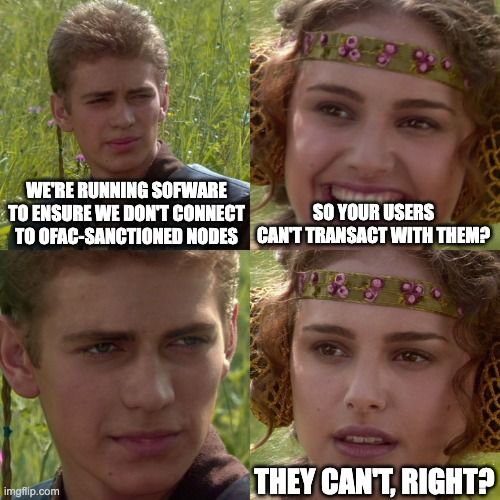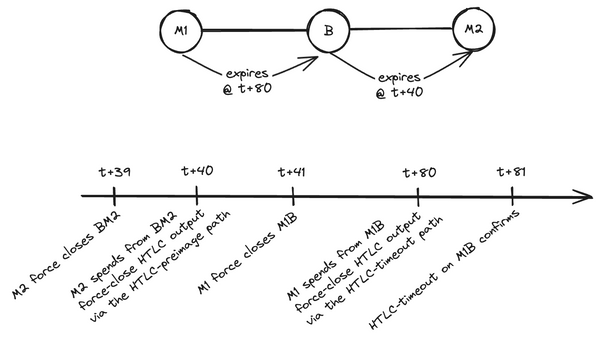Latest Strikes 57

Hi there, Lightninger! I know it comes a bit late (it's satsturday already!), but here's what you've been waiting for all week: your recap of all the great things that happened in the Lightning world last week. As you'll see, it was a good one, with lots of interesting ideas and some Taprooty developments. Buckle up!
Ecosystem
Artists Splits In Wavlake
Wavlake introduced a new feature called Artists Splits which artists can use in any of their track to split zapping revenue between a set of Wavlake users. For example, a band of 4 players could use this feature to easily and automatically split zaps between themselves. Artists could also thank long time fans for their support with a split of their tipping revenue. It's also worth noting that this splitting mechanism is completely composable with others. For example, a podcast host airing a track from our 4-players band could redirect the incoming flow of sats sent by listeners while the music is playing directly to the band using the Value Time Split feature of Podcasting2.0, and the money would then automatically be split between the 4 artists, without the podcast host or the listeners even needing to be aware of that. Kinda cool.
Sports Betting On Lightning
Online sports betting and Lightning seem to be a good fit. Lightning gives gamblers the ability to deposit small amounts instantly and with little to no fee, and likewise withdraw instantly when the bet is over, thus enabling everyone to play with sums they are comfortable with. While Betplay already accepts Lightning deposits and withdrawals, it is still lacking the "Lightning-native" feel. For example, you need to deposit first before being able to enter a bet, while a Lightning-native experience would be to be able to deposit the exact amount you intend to bet right when you're betting. It's just a better user experience, and also a safer one, since it means gamblers can keep most of their funds out of the platform most of the time.
Addressing this obvious void, a new Lightning-native betting platform called Triible was launched last week, with feature such as Lightning Login (a.k.a LNURL-Auth) and just-in-time deposits, as we mentioned above. Curious to see how it goes.
Wallets & Tools
Mutiny
The Mutiny team added a smart onboarding feature to their wallet, enabling current users to gift sats to anyone, even if they don't have a Lightning wallet yet. Where it really differentiates from other similar sats-gifting mechanisms is that it doesn't require any intermediary to take custody of the funds at any time, while ensuring that the funds don't get lost if the recipient never claims them.
This is achieved by using Nostr Wallet Connect (NWC, which we already covered several times in this newsletter): the gifter pre-authorizes the receiver to request the funds once at a later time. The gifting link itself contains everything the receiver needs to create their Mutiny Wallet and claim the funds by requesting them from the sender, over Nostr. If the recipient doesn't claim the gift, or the sender doesn't want to gift those sats anymore (a bit silly, I know), they can revoke the access anytime. So that's quite a nice way to hand out friends, relatives or bartenders their first sats!
The Mutiny team also shared some of their advancement on making the Mutiny stack both more robust and more easy to self-host.
A New Self-custodial Lightning Wallet
A new cool, indie self-custodial Lightning wallet was released last week. Bjli let's you open channels and send and receive funds on-chain and over Lightning, and uses the Lightning Dev Kit behind the scene.
The wallet doesn't has any Lightning Service Provider (LSP) feature (yet?), which means the user needs to acquire inbound liquidity on their own, either by using a liquidity marketplace, or by opening a channel and pushing funds to the other side (for example, by paying someone else). Interestingly, the wallet already gives users the option to push funds to the peer when opening a channel, which is nice UX-wise since it fosters the "make every transaction a channel opening" mantra: if you're doing an on-chain transaction to pay someone, you might just as well open a channel to them and push the amount you're paying on their side. This way, you'll be able to reuse the channel for future payment, for close to zero additional cost.
Moar Releases
- LNBits just got better with the addition a node management panel, letting the LNBit's instance admin manage the channels of the underlying Lightning node directly from LNBits. It also ships a webpage that other people can visit to see get the details they need to open a channel to your node.
- Running a Bitcoin/Lightning node just got easier with the release of the v2 of the Parmanode, an easy to install OS that aims at making it easy to run the full Bitcoin/LN stack.
- Taproot Lightning channels made it to RideTheLightning, and can now be requested from the LSP in Zeus
Spec & Implems
LND 0.17
LND 0.17 is out, with more cost-efficient and privacy-preserving channels, faster syncing for light (e.g. mobile) nodes and improved watchtowers.
- Taproot channels improve privacy by making channel operations look like normal transactions, while also saving on fees. To get the most of the privacy enhancement Taproot brings, it is best to use unannounced channels.
- Syncing is now 400x faster due to fetching filters in batches instead of individually.
- Watchtowers now use less memory and are more reliable by replaying updates if a tower is removed.
LDK 0.0.117
The Lightning Dev Kit also shipped an update last week, brining enhanced payment reliability, batch opening of channels, as well as security improvements around anchor channels.
Trivia Of The Week
How are timelocks used in the Lightning Network?
Answer
Timelocks are essential components in the Lightning Network that serve various purposes, primarily through two different Bitcoin opcodes: OP_CHECKLOCKTIMEVERIFY (CLTV) and OP_CHECKSEQUENCEVERIFY (CSV).- CLTV (OP_CHECKLOCKTIMEVERIFY) specifies an absolute time or block height before which an output cannot be spent. In Lightning, CLTV is primarily used in Hashed Timelock Contracts (HTLCs) to set an expiration time. If the payee doesn't claim the funds by revealing the pre-image of the hash before this time expires, the payer can safely reclaim the funds. CLTV essentially provides a window during which a payment can either be completed or reclaimed.
- CSV (OP_CHECKSEQUENCEVERIFY) sets a relative timelock, indicating a number of blocks that must pass after a UTXO is confirmed before it can be spent. In Lightning, CSV is used in commitment transactions, which are unbroadcast Bitcoin transaction through which peers sharing a channel agree on the new state of their channel. When a channel is unilaterally closed, the party closing the channel must wait for a predetermined number of blocks (`to_self_delay``) to pass before they can spend their funds. This delay provides a chance for the other party to intervene and broadcast a penalty transaction if an old, revoked state is maliciously published.
Closing Bit
Expérience à deux de physique quantique :
Nos regards verrouillés en une étreinte haptique
Les photons messagers de l'amour qui nous lie
Filent sans déranger Heisenberg et sa clique.





